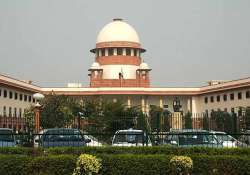No lobbying involved in designating lawyers as senior advocates: Supreme Court
New Delhi: The Supreme Court today sought to dispel the impression among legal fraternity that lobbying with judges plays a pivotal role in designating a lawyer as a senior advocate.The apex court, at the same

New Delhi: The Supreme Court today sought to dispel the impression among legal fraternity that lobbying with judges plays a pivotal role in designating a lawyer as a senior advocate.
The apex court, at the same time, said there is a need for uniform rules across the country in designating senior advocates.
“We ensure that among judges there have never been in the Supreme Court any lobbying.
People here who are judges have come from various parts of the country and there have been no intention pulling anybody down or pushing anybody up,” a bench headed by Justice T S Thakur observed. However, the bench also comprising Justices V Gopala Gowda and R Bhanumathi, conceded that “there appears to be general disenchantment among the members of the Bar on the issue” and “there is a need for rules, something that can be applied uniformly to all high courts in designating senior advocates”.
The observations were made by the bench which was hearing a petition filed by senior advocate Indira Jaising seeking judicial scrutiny of the Supreme Court's method to designate lawyers as ‘senior advocates', terming the present process as opaque, arbitrary and fraught with nepotism.
During the hearing, she got support from other senior advocates like Kapil Sibal, Vivek Tankha, Rajiv Dhavan, M N Krishnamani and others, who in one voice said transparency was lacking in designating lawyers as senior advocates and there was a need to take corrective measures.
The Bench, which in the beginning tried to persuade Jaising by saying that the prevailing system was applied for designating her as senior advocate at a relatively younger age in 1986 and she never had any grievances, decided to examine the issue after she got support from other senior lawyers.
It issued notices to Bar Council of India, apex regulatory body of lawyers, Supreme Court Bar Association and Supreme Court Advocates-on-Record Association and sought their responses on the issues raised by Jaising who was the first woman Additional Solicitor General of India in the previous UPA government.
The apex court also sought the assistance of Attorney General of India for evolving the uniform rules and guidelines for designating senior advocates which in the recent times have been mired in controversy.
The bench said the system of voting by all judges was introduced in 2014 for selecting laywers to be designated as senior advocates as secret ballot would help them in giving their opinion without any apprehension. Sibal submitted that voting pattern in designating a lawyer as senior involves “lobbying” which is a serious matter.
At the outset, the bench raised the issue of locus standi on Jaising filing the petition and not those lawyers affected by the system.
Jaisingh said the petition was filed by taking the consent of lawyers who recently and in the past lost the race and have grievances against the system.
The senior lawyer said advocates taking up matters of human rights, public interest litigations are being ignored and there was need to analyse data relating to the cases argued, judgements delivered in their matters and their contribution to jurisprudence and legal aid programmes.